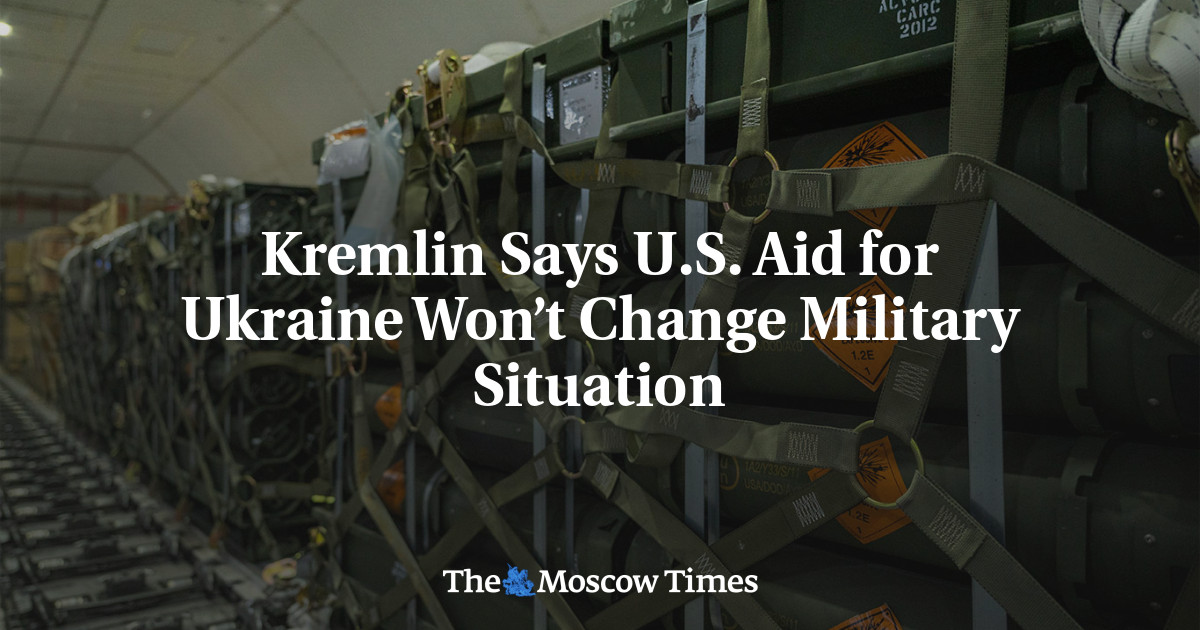
Russia said Thursday that fresh U.S. aid for Ukraine will not change the dynamics on the battlefield, as Washington gears up for a crucial weekend vote on long-stalled military funding for Kyiv.
U.S. House Speaker Mike Johnson said Wednesday he would advance a $61 billion package of funding for Ukraine, stalled since last year amid political infighting in the Republican Party.
Ukraine has struggled on the battlefield for months, outgunned and outnumbered by Russian forces amid a shortage of Western military aid.
The Kremlin said Thursday it was not bothered by the prospect of a fresh injection of Western arms.
“It won’t in any way influence the development of the situation on the front,” Kremlin spokesman Dmitry Peskov told reporters Thursday.
“All experts now assert that the situation on the front is very unfavorable for the Ukrainian side. Therefore it will not be able to change anything,” he said.
Ukrainian President Volodymyr Zelensky has said the months-long delay has cost Ukraine lives and territory.
Kyiv is dependent on Western funding to stave off the Russian offensive.
Washington has been Kyiv’s most important military backer throughout the conflict, now in its third year.
The lack of fresh funding has become increasingly critical, with Ukrainian leaders urging support on an almost daily basis.
“We need this money yesterday, not tomorrow, not today,” Ukrainian Prime Minister Denys Shmygal told the BBC on Wednesday.
After months of stalemate on the frontlines, Russian troops have started to chalk up some of their first territorial gains this year.
Although only modest so far, Moscow is seeking to press its advantage on the battlefield, hoping to secure a decisive breakthrough with Kyiv on the back foot.
Energy restrictions
U.S. President Joe Biden said he would sign the aid package into law “immediately” after it passed through Congress.
The White House has grown exasperated at the hold-ups in recent months, and the U.S. Senate passed its own version of a bill in February.
It remains unclear if Johnson’s measures will pass the House or the Democratic-controlled Senate.
His majority in the lower chamber is razor-thin, and he is facing a potential Republican revolt over the complex plan.
At a G7 summit in Italy on Thursday, Ukraine’s Foreign Minister Dmytro Kuleba pressed the need for Patriot air defense systems during a meeting with U.S. Secretary of State Antony Blinken.
As the aid debate has rumbled on, both Russia and Ukraine have ramped up aerial attacks in recent weeks, hitting military and energy facilities deep behind the front lines.
Ukraine on Thursday urged businesses to limit their power usage during peak hours as a cold snap threatened blackouts following weeks of Russian strikes.
“Given the significant damage caused to the power system by hostile attacks, as well as the sharp drop in temperature and the corresponding increase in the load on the power system, it is important to use electricity wisely,” Ukraine’s energy ministry said.
“We ask consumers, both domestic and industrial, to reduce the use of energy-intensive appliances during peak hours” between 7:00 p.m. and 10:00 p.m., it added.
Ukrainian attacks this year have also hit a string of Russia’s oil refineries, knocking the country’s output of fuels like petrol and diesel.
Both sides have justified their strikes as legitimate.
Kyiv also on Thursday said its forces had struck a large Russian airfield on the annexed Crimean peninsula a day earlier, claiming to have destroyed an array of enemy equipment.
On the battlefield, Russian shelling killed two people in Ukraine’s eastern Donetsk region, local authorities said.
Ukrainian strikes on Horlivka, a town in the Donetsk region controlled by Russian forces, injured eight people on Thursday, the Moscow-installed regional head Denis Pushilin said.
“A hospital and blood transfusion station were targeted and damaged,” Pushilin said in a post on Telegram.